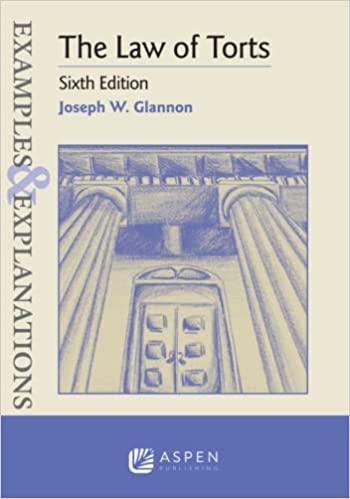Question
Any help on my upcoming quiz will be appreciated questions below. Q5. Discuss the two (2) questions asked by judges to determine whether or not
Any help on my upcoming quiz will be appreciated questions below.
Q5. Discuss the two (2) questions asked by judges to determine whether or not they must follow the decision made in an earlier case and provide two advantages of utilising precedent cases.
Scenario 1
One Saturday evening, David 'Evil' Keneval (38 years old) was enjoying himself at a BBQ at his neighbour's house. After a few beers 'Evil' decided to enter into a conversation with his neighbour, Jack Green. Keneval and Green began by talking about football however the conversation turned to the question of refugees. The conversation quickly became very heated as Keneval's father was a refugee and Green was a 'bogan' and extremely racist. Green finally lost his temper and yelled to Keneval "you and your lot should go back to where you came from".
Keneval then lost his temper and retaliated by smashing the top off his VB stubby bottle and struck Green once to the right side of face with the jagged edges of the broken stubby bottle. The police and an ambulance were called. Green suffered from a large laceration to his right cheek requiring 80 stitches ($1,500 in medical expenses) and was unable to return to work for two months ($8,000 lost wages). He was further devastated when his girlfriend left him due to the hideous injury to his face.
The police subsequently charged Keneval with 1 x Wounding pursuant to s.323(1) of the Criminal Code which states:
(1)A person who unlawfully wounds anyone else commits a misdemeanour.
Maximum penalty - 7 years imprisonment.
Based on the above scenario answer the following questions.
Q6. Explain two (2) options police have for commencing criminal proceedings against Keneval (bringing him before the court). Discuss which option you would consider is more appropriate and why.
Q7. Use your knowledge of the criminal justice process to explain the implications of David Kenevel entering a plea of not guilty. Explain the court process Keneval would be subject to if he chose to plead not guilty to the offence. Use the following sub-headings to structure your response.
a)The relevant steps in the criminal court process (which courts will he appear in and why).
b)The classification of the offence Keneval is being charged with. (Hint: Is it a crime/misdemeanour/simple offence? Is it indictable/non-indictable?)
c)Which court has jurisdiction to hear the matter? Explain the steps you took to arrive at your final answer.
Q8. If Keneval is found Guilty after a trial, what are the penalties that could be imposed by the Judge in the sentencing of Keneval?". List three (3) penalties that you believe would be appropriate for Keneval in consideration of the circumstances of the offence and justify your reasoning.
Judge Brown heard a matter, similar to Keneval's two months ago in the matter of R v Jones (2015). In this matter the Judge stated the following:
....Mr Jones, I have taken into consideration all of the mitigating factors, especially your background as a refugee and English as your second language when sentencing you today. However, you still lost your temper and assaulted a man using a beer bottle which resulted in serious injuries to the victim. This is unacceptable in our society and requires an appropriate punishment. As such I am sentencing you to 3 years imprisonment, wholly suspended....
Q9. Before the Judge sentences Keneval, the Judge must take into consideration sentencing guidelines.These guidelines are under Section 9(2)of the Penalties and Sentences Act 1992.List three (3) circumstances under Section (2) that you think apply to Keneval and explain why you think they are relevant.
Q10. Please explain the role of the following parties during the District Court trial of Keneval for the charge of Wounding:
a)Keneval's solicitor
b)Keneval's barrister
c)Crown Prosecutor
d)The Judge
Q11. Discuss the role of precedent in the court's determination of the matter.
Q12. Could Green (the victim in this criminal matter) pursue a civil case against Keneval? If so, discuss in detail what kind of civil action could be brought.
Q13. Compare and contrast the terms an act of 'battery' under the law of torts and the act of assault under the criminal law?
Q14. Compare and contrast the differences between any civil actions Green may pursue and the criminal proceedings instigated by police (outline how civil cases are different from criminal including the onus of proof required for both civil and criminal law).
a)Which party initiates the proceedings and why?
b)Who has the burden/onus of proof?
c)What the standard of proof is for each matter?
Q15. Discuss at least two (2) advantages of having a court hierarchy.
Q16. Compare and contrast the QLD Courts in order of hierarchy ensuring that the maximum terms of imprisonment and civil claims amounts are included.
Q17. Discuss the significance of the following parts of a statute.
a)Act Number
b)Definitions
c)Sections
d)Chapters
Q18. Use your knowledge of the law making process to explain the six (6) steps for passing a bill.
Q19. Discuss each of the following common law statutory interpretations.
a)Literal Rule
b)Golden Rule
c)Mischief Rule (Purposive Approach)
Q20. Construct a flow chart to illustrate the seven (7) steps a civil proceeding follows through Australia's civil law system.
Q21. Recently, the ACT Government introduced a law allowing for marriage for same sex couples. The Commonwealth challenged that legislation. Discuss how this conflict between the ACT and the Commonwealth legislation was resolved.
Step by Step Solution
There are 3 Steps involved in it
Step: 1

Get Instant Access to Expert-Tailored Solutions
See step-by-step solutions with expert insights and AI powered tools for academic success
Step: 2

Step: 3

Ace Your Homework with AI
Get the answers you need in no time with our AI-driven, step-by-step assistance
Get Started


